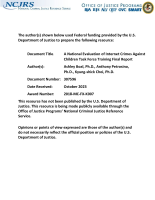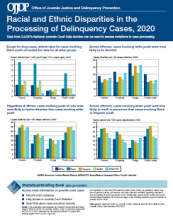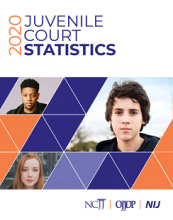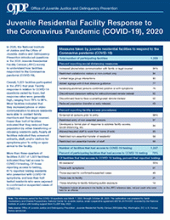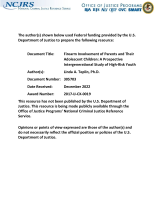COVID-19
Cognitive Schemas and Fertility Motivations in the U. S. during the COVID-19 Pandemic
Changes in Stress Levels during the COVID-19 Pandemic: The Role of Involvement in Criminal Behavior
The Effects of Hot Spot Policing on Community Experiences and Perceptions in a Time of COVID-19 and Calls for Police Reform
Individual and School Predictors of Teacher Stress, Coping, and Wellness During the COVID-19 Pandemic
A National Evaluation of Internet Crimes Against Children Task Force Training Final Report
Burnout Among School Staff: A Longitudinal Analysis of Leadership, Connectedness, and Psychological Safety
Webinar: NIJ Research Assistantship Program Informational Webinar
This recorded webinar, originally held September 28, 2023, provides information on NIJ’s Research Assistantship Program, which offers highly qualified doctoral students the opportunity to bring their expertise to NIJ to work across offices and program areas to obtain a practical and applied research experience. The program is a research focused professional development opportunity for doctoral students from all academic disciplines. NIJ...
Race, ethnicity, phycological factors, and COVID-19 vaccine hesitancy during the COVID-19 pandemic
Exploring the Impact of Station Dog Programs on Agency Wellness and Community Relationships
NIJ Multisite Impact and Cost-Efficiency Evaluation of Veterans Treatment Courts
Nanoparticle-Decorated Micropillars As Integrated Raman Spectroscopy and Mass Spectrometry Substrates for Quantitative and High-Throughput Toxicology Drug Analysis
Racial and Ethnic Disparities in the Processing of Delinquency Cases, 2020
Intimate Partner Violence and Family Dispute Resolution: 1-Year Follow-Up Findings From a Randomized Controlled Trial Comparing Shuttle Mediation, Videoconferencing Mediation, and Litigation
Juvenile Court Statistics, 2020
Police Use Science and Community Partnerships to Reduce Gun Violence
Impacts of Successive Drug Legislation Shifts: Qualitative Observations from Oregon Law Enforcement
Juvenile Residential Facility Response to the Coronavirus Pandemic (COVID-19), 2020
Race, Ethnicity, Psychological Factors, and COVID-19 Vaccine Hesitancy During the COVID-19 Pandemic
Innovative Vibrational Spectroscopy Research for Forensic Application
Gang intervention during COVID-19: A qualitative study of multidisciplinary teams and street outreach in Denver
Validating Isoscaping Methods: A Study of Oxygen, Strontium, and Sulfur
The effects of community-infused problem-oriented policing in crime hot spots based on police data: A randomized controlled trial
Economic Justice for Survivors of Intimate Partner Violence
See the YouTube Terms of Service and Google Privacy Policy



